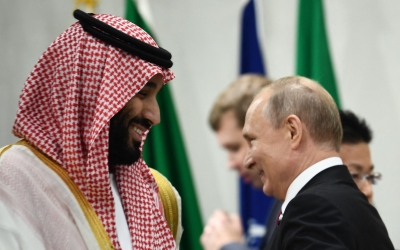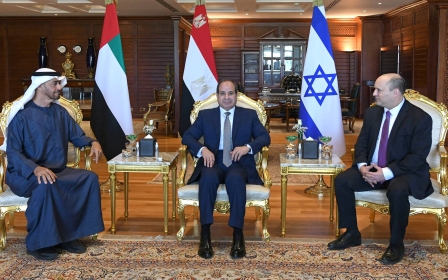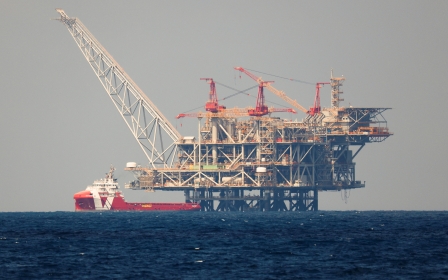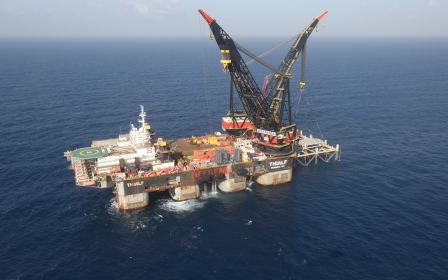Energy prices: Will Saudi Arabia, UAE and Qatar answer West’s calls for relief?
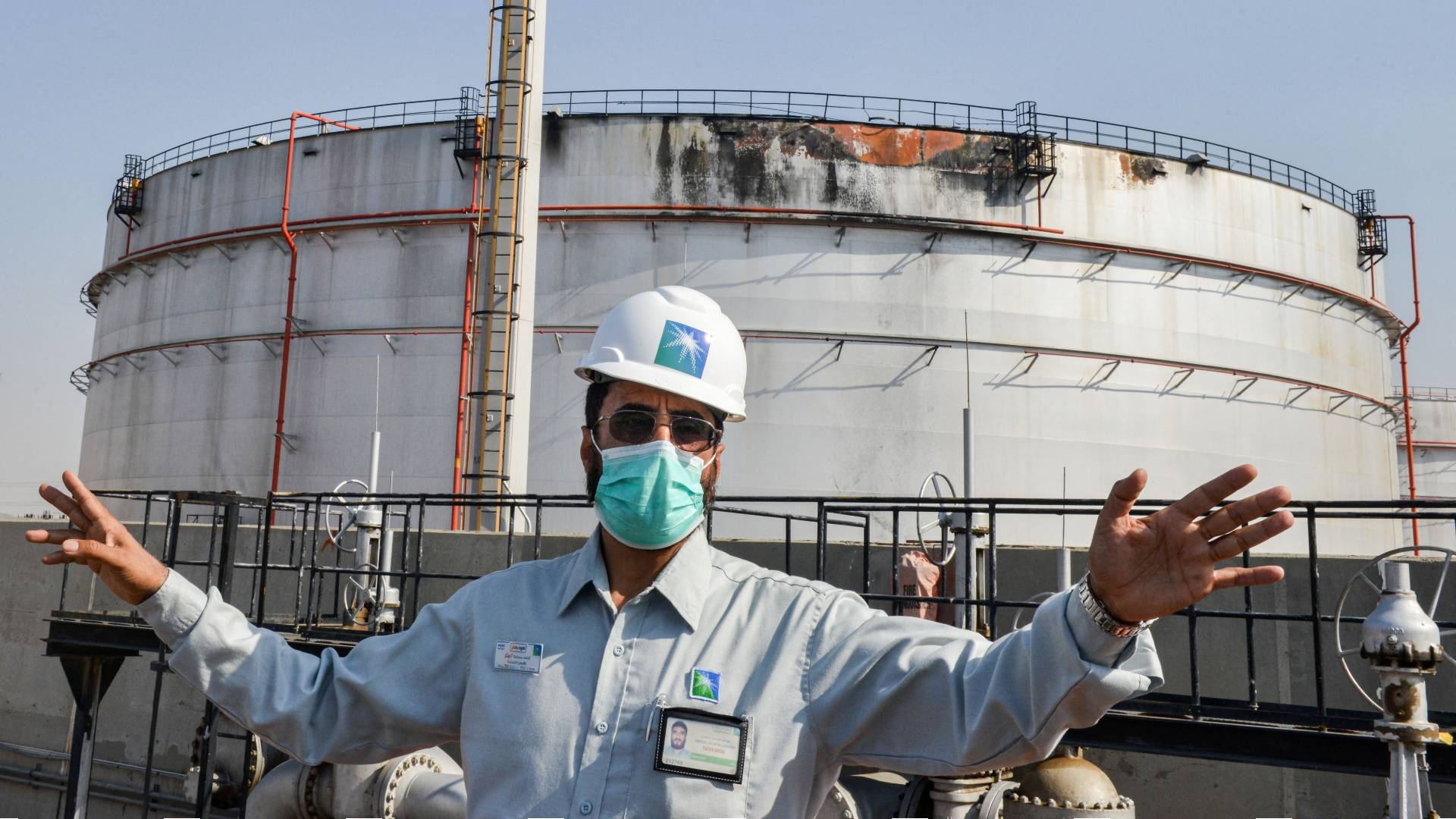
One month after Russian tanks first rolled into Ukraine, oil prices have soared, and western countries are intensifying calls to Saudi Arabia and the United Arab Emirates to boost their oil production to help stabilise global energy markets.
New MEE newsletter: Jerusalem Dispatch
Sign up to get the latest insights and analysis on Israel-Palestine, alongside Turkey Unpacked and other MEE newsletters
So far, the requests have been snubbed by the Arab leaders, with Saudi Crown Prince Mohammed bin Salman (MBS) and Abu Dhabi's Crown Prince Mohammed bin Zayed (MBZ) repeatedly declining to set up phone calls with US President Joe Biden to discuss the oil price spike.
MBS and MBZ have kept a lukewarm relationship with Biden since his inauguration as president in 2021, unlike with his predecessor Donald Trump.
For the crown princes, there’s a two-fold strategy here: the political machinations by Saudi Arabia and the UAE in relation to US policies in the region, and a chance to beef up their states' coffers from oil revenues.
"There's a shared feeling between Saudi Arabia and UAE that the US had let them down, and that it is not committed anymore to the terms of Roosevelt and King Abdulaziz agreement," Hashem Akel, an expert in energy markets, told Middle East Eye, in reference to the 80-year-old alliance between Washington and Riyadh.
A distrust for the US
Long gone are the goodwill and allegiance Washington and Riyadh once had for each other, which began at a 1943 meeting between Prince Faysal bin Abdul-Aziz Al Saud who came to Washington to meet then-US President Franklin D Roosevelt. This was followed by a meeting in Saudi Arabia in 1945 between King Abdulaziz and the US president.
The historic occasion ushered in a new era between the two nations, with the US granting Saudi Arabia and Gulf countries military protection, as well as helping them build and develop their states in return for access to oil, of which Riyadh holds 16 percent of the world's reserves.
Yet, decades later, this modus operandi had been disrupted by an increase in drones and missile attacks launched by Yemen's Houthi rebels - who are backed by Iran - on Saudi oil sites and UAE ports.
'There's a shared feeling between Saudi Arabia and UAE that the US had let them down'
- Hashem Akel, energy market expert
As a result, both Riyadh and Abu Dhabi became alarmed when the US decided to remove the Houthis from its terror groups list in February 2021.
Their concerns, echoed by Israel, grew further last week when the US said it was considering removing Iran's Islamic Revolutionary Guards Corps (IRGC) from the terror list.
"In politics, there are only interests. The US remained idle when the Houthis attacked Saudi oil facilities. It did not ensure protection to Riyadh from these attacks," Akel said.
"When Biden keeps ignoring MBS, who is the leader of Saudi Arabia, the decision-maker, and the future king, this also adds insult to the injury. Saudi Arabia has the economic power to do what it thinks is best for it," he explained.
While other nations struggle with a spike in energy costs, rising oil prices work in Saudi Arabia and UAE's best interests.
A veteran commodities trader, Doug King, told Bloomberg on Wednesday that Brent crude would likely hit $150 a barrel this year, as travel increases following the pandemic and supply falls short due to sanctions on the Russian economy. As of Thursday morning, oil price per barrel is standing at $122.
The UAE also had a bumpy start with the Biden administration, when lawmakers from the Democratic Party tried to stall the sale of F-35 fighters jets to the UAE as part of $23bn military contracts, including drones and advanced munitions.
In December, Abu Dhabi said it would suspend talks on the deal, and in February, it announced a plan to buy a dozen of Chinese L15 Falcon as the UAE sought to strengthen its defences following Houthi attacks on its ports.
'Sailing in the same boat'
Another crucial factor for Riyadh and Abu Dhabi not to answer Biden's calls is Iran, seen as the arch-rival to Gulf countries, with Qatar an exception which shares with the Islamic Republic the world's largest gas field in the Gulf.
Analysts expect the US and other world powers - including China, France, Germany, Russia and the UK - to sign and revive the 2015 nuclear deal with Iran, officially known as the Joint Comprehensive Plan of Action (JCPOA).
If the agreement is reinstated, the US would lift some economic sanctions on Iran, then Tehran would be able to sell its crude oil on the international market, reducing the dependency on Russian oil.
"The Americans and Iranians are sailing in the same boat, each holding a paddle. A war between the US and Iran, or Iran and Israel, is not an option now," Akel said.
“[There’s an opposing feeling towards Washington] when the Saudis and Emiratis see it strengthening Iran with the nuclear deal, as the US interest urgently needs Iranian oil in the market."
Yet, if Saudi Arabia and UAE were to accept requests from the US to boost their oil production, it would still take two to three months before any increase can be seen, as oilfields and machines need maintenance before they can start kicking in, Akel explained.
"Oil is more volatile to energy markets as oil future contracts are set in three months, while the future gas contracts are set in five years and sometimes more. That's why gas prices are more stable," Akel said.
Qatar's LNG
Following western sanctions on Russian oligarchs and state-owned companies since the invasion of Ukraine on 24 February, US and European leaders have been examining every possible option to steer away from reliance on Russian oil and gas.
Qatar is a significant producer of liquefied natural gas (LNG), and it had warned days before the Russian invasion that it would be "almost impossible" to replace Moscow's gas quickly. Doha exports gas to South Korea, China, India, Japan and Pakistan.
'The Americans and Iranians are sailing in the same boat, each holding a paddle. A war between the US and Iran, or Iran and Israel, is not an option now'
- Hashem Akel, energy analyst
Unlike oil contracts, which expire in three months, Qatar is locked into LNG contracts for 22 years with China in 2018 and 20 years with South Korea in 2021.
In 2021, the EU and UK imported 70 percent of their LNG from the US (26 percent), Qatar (24 percent) and Russia (20 percent), according to figures by Cedigaz, a natural gas information group.
The European Union had long objected to Qatar's LNG long contracts, making it hard to switch supply to meet demand quickly in other regions. Half of the EU's LNG imports are made in spot- and short-term contracts, which the EU prefers.
Doha had been in negotiation in recent weeks with Germany to reach a long-term energy partnership, though the deal has yet to be finalised.
"Qatar could not shift these gas supplies to Europe as it breaches the contracts with the other parties," Akel explained.
Egypt boosts gas export
The EU's urgent need to replace Russian gas had raised hopes in Egypt to boost its gas exports to Europe.
"Egyptian LNG exports normally head to Asian markets, but over the past months most cargoes were delivered to European markets, given unusually high prices and concerns over Russian gas supplies," Mona Sukkarieh, a political risk consultant and co-founder of Middle East Strategic Perspectives, told MEE.
In 2019, Egypt had reached self-sufficiency in gas following years of being a net importer. Its two LNG plants in Idku and Damietta in northern Egypt have a combined capacity to produce 12.2 million tonnes of LNG per year.
According to Sukkarieh, those plants are "running at full capacity, or close to capacity, so there isn't much room to boost exports further. Though important, these are relatively modest volumes, which will not necessarily be all heading to Europe."
She added that "any expansion of Egypt's export capacity would require additional investments and a long time frame to materialise."
Geopolitical challenges
Another energy option for the EU is a pipeline that would bring Israeli gas to Europe through Turkey from the eastern Mediterranean. But this option is fraught with risk, and it could take years.
"The Turkish market is one of the most logical destinations for offshore East Med gas resources. But considerable challenges stand in the way of an Israel-Turkey pipeline, including geopolitical challenges as it would have to pass through Cyprus' exclusive economic zone and these challenges would have to be addressed," Sukkarieh said.
'Any expansion of Egypt's export capacity would require additional investments and a long time frame to materialise'
- Mona Sukkarieh, political risk consultant
Algeria is also a gas producer and has two pipelines under the sea to Italy and the second to Morocco and then to Spain. But last November, Algeria shut down its second pipeline due to political tensions with Rabat.
"Algeria produces gas but in small quantities, not enough to sustain Europe. Morocco had also discovered new gas fields, but this would take time before exporting becomes possible," Akel said.
This leaves the US having to look to Riyadh to help solve Europe's gas needs, and having to patch up a relationship gone sour. Akel added: "I think the Americans will rethink their policies, especially after Saudi Arabia discovered five gas fields in February. Saudi Arabia is rich with oil, gas and minerals, and the country has much to offer."
This article is available in French on Middle East Eye French edition.
Middle East Eye delivers independent and unrivalled coverage and analysis of the Middle East, North Africa and beyond. To learn more about republishing this content and the associated fees, please fill out this form. More about MEE can be found here.


